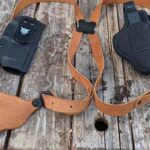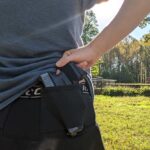- Evaluate your situation
- Respond without answering the question
- Identify their intentions
- React accordingly
- Reassess your habits
Table of Contents
1. Evaluate Your Situation
I’m a proponent of situational awareness. When someone asks if I’m carrying a gun is no different. Remain calm and take note of your surroundings. Are you in a seedy neighborhood? If this person has nefarious intentions, could there be accomplices nearby? Understanding the likelihood of a threat will help you navigate this uncomfortable question.
2. Respond Without Answering
When someone asks if you are carrying a gun, you can respond using several methods. Deflection, avoidance, and humor are the least aggressive responses. Regardless of the tactic, your initial response should neither confirm nor deny whether you are carrying a gun. Typically, a persons body language and reaction to your response alludes to their intentions.
Below are some examples of different types of responses:
- “Why? Are you carrying one?” – Deflection
- “What an odd question.” – Avoidance
- “You mean this?” (flex one of your arms) – Humor
Unless the person has identified themselves as law enforcement conducting their duties, you are under no obligation to give a response. However, failing to acknowledge the person asking the question is a bit tactless. Therefore, it’s best to provide a non-committal answer.
3. Identify Their Intentions
When someone asks if you are carrying a gun, it’s usually for one of three reasons; curiosity, fear, or to harm you.
If the person asks out of curiosity it’s usually because they are a gun enthusiast themselves and genuinely interested in talking about your firearm. Your initial response may prompt an explanation and follow up questions.
Fear is another motivator for this type of question. Someone who fears or dislikes guns may inquire to confirm their own bias before berating you about your choice to carry a gun. Your initial response might cause this person to backpedal or disengage altogether. Alternatively they might double down and become more assertive.
Finally, someone might ask if you’re carrying because they have nefarious intentions and are assessing if their intended victim is defenseless. These types of answers might agitate a would be criminal leading to more aggressive behavior or language.
4. Respond Accordingly
Once you have a reasonable estimate of their intentions, the initial question about whether you are carrying a gun becomes much more manageable. For instance, a gun enthusiast will likely respect your decision to disengage completely. However, they will also welcome an open discussion if you chose to further engage with them.
Alternatively, disengaging with a person who either dislikes or fears guns is more difficult. Generally, you’ll want to end the conversation without further discussion of firearms. Guilt, outright lies, or brutal honesty are all useful techniques to end the conversation with a person who dislikes guns.
Below are a couple other responses about whether you carry a gun:
- “I actually have a condition that requires a medical device.” (guilt)
- “I would never carry a gun.” (lie)
- “That’s none of your business” (brutal honesty)
How To Respond To A Bad Actor
In the unlikely event that you are targeted by a potential criminal, you should proceed with caution. First, be vigilant of your surroundings and attempt to retreat to a safe distance. Remember, there is no guarantee the speaker is the only threat.
Second, create both cover and obstacles for your assailant if possible. For instance, maneuver around your vehicle or the surrounding structures. Should you need to employ self defense measures it will give you an advantage.
Finally, identify a means of escape. Perhaps this means entering a well-lit, nearby, and occupied structure. Or, simply getting into your vehicle and driving away if the opportunity arises. Remember that using your firearm is a last resort, you should always look to disengage if possible.
5. Reassess Your Habits
Once you’ve extracted yourself from any of the above scenarios you need to reassess your concealed carry habits. Nobody asks whether you are carrying a gun without cause. Are you printing? Is your attire unsuitable to adequately conceal your firearm? Sometimes, a holster check is enough to prompt the question about whether you are carrying a gun. Regardless, if your goal is to prevent this question in the future then evaluate all your habits. Alternatively, these types of interactions may not phase you. But, you should still be mindful of what tipped the other person off.
Exceptions To This Method
The above steps will help you navigate 90% of the chance encounters with the public. However, not everyone who asks you whether you’re carrying a gun is a civilian. Therefore, understand your local laws when interacting with law enforcement or private property owners.
When Law Enforcement Asks About Your Gun
Interacting with law enforcement is a bit trickier than the general public. However, if a law enforcement officer (LEO) asks if you are carrying a gun use these techniques to ensure both your safety and the safety of the officer.
First, ask them to provide identification and prove affiliation with law enforcement. This is for your safety, and ensure the individual is not simply impersonating a LEO.
Second, understand whether your state has “duty to inform” laws in place. These types of laws specifically say that you must divulge to the officer that you have a gun. However, do not attempt to display or otherwise access your firearm without instruction from the officer.
When A Private Property Owners Asks About Your Gun

Property owners are another special scenario. Some states have laws where “gun free zone” or “no gun” signs carry the weight of law. Therefore, use caution when interacting with a property owner or lessee. Usually, its simply better to leave the premises than further interact with a property owner who disdains firearms. Furthermore, they are likely to ask you to leave regardless of your response, and failure to comply means you are trespassing.
Parting Shots
Handling the awkward situation where a stranger asks if you are carrying a firearm takes poise and finesse to navigate. Additionally, pay attention to your surroundings during the interaction to ensure your safety. Remember, these situations are rarely the result of someone with ill intentions. However, you should always exercise caution.
Note: All the information contained within this article is based upon my own research and opinions and in no way constitutes legal advice. You are responsible for familiarizing yourself with local laws.










